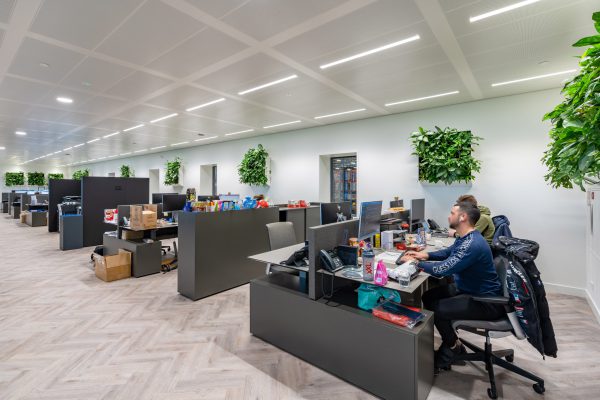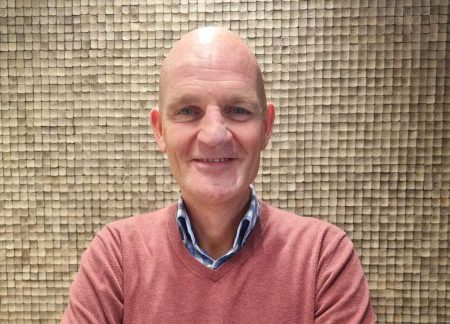"New ERP software also brings a cultural shift."
Because outdated information systems were blocking further growth, SRG International decided to look for a new solution. It was a major challenge: while trade is in the company’s DNA, IT is much less part of its core. That’s why it was important to find a partner who not only had the right knowledge, but also understood the company’s culture.
ERP and WMS at SRG
SRG International is a company that supplies so-called fast-moving consumer goods to the non-food and discount retail sector. This often includes food items—such as sweets—and personal care products like soap. The company buys large stock lots, but also purchases directly from major food corporations such as Mondelez and Nestlé. Thanks to carefully built and maintained relationships with retail chains like Action and various discounters, SRG has access to a broad sales market. “Trade is in our company’s DNA,” says John van Ravenstein, Director of Logistics, Warehousing, VAL Activities and Transport Planning. In recent years, a lot has changed. The current management team took over the shares from the company’s founder a few years ago, partly with the help of external investors. In 2019, the company changed its name from Strootman Retail Group to SRG International and moved from its outdated location in Oudenbosch to a brand-new facility in Oud-Gastel.

Unnecessary manual work
Replacing several key business information systems was high on the agenda at the time. “Our ERP and WMS systems are now over ten years old and haven’t had any updates since,” says Van Ravenstein. “Some features that are now considered standard simply aren’t part of our software.” “As a result, we’re still working in the same way as we did ten years ago—while our turnover has tripled. This leads to slow and inefficient processes that are not properly supported by our systems. It means we still do a lot of manual work, such as keeping information in Excel lists and entering the same data twice. On top of that, the data quality throughout our processes is quite poor.” “You can try to work harder and add more people, but what we really need is to make our processes more efficient.”
Clear expectations
Through its own network, SRG went looking for a partner who could support both the ERP selection process and the implementation of a new system. “For us, it was also very important that this partner would fit our company culture and understand where we currently stand in terms of knowledge, experience and maturity. Trade may be in our DNA, but our IT function is fully outsourced, and only a few people oversee the full process from start to finish.” With Skopos, that match was found. After a convincing presentation to the management team, a two-day Pressure Cooker session was organised to assess the current situation and deliver clear advice. “This was valuable for everyone in our company. The sense of urgency became clear to all involved, and expectations for the project were clearly defined. One of the outcomes was that we needed to invest—not only in process improvements across departments, but also in our people.”
Defining the desired situation
After the first assessments, employees from SRG International and consultants from Skopos worked together to map out all current processes, including pain points and opportunities for improvement. The desired situation was also clearly defined, and the teams jointly worked on improving processes step by step. This blueprint formed the basis for the ERP system selection. It will also serve as the foundation for the implementation, which will take place over the coming months. “Together with Skopos, we reviewed all of our processes and explored the market to find suitable suppliers and systems. During that phase, the question came up whether we should implement both an ERP and a WMS system at the same time. In the end, we decided to start with ERP only, because doing both would make things too complex for our organisation.” The warehouse system will follow later.
An action-oriented solution
The ERP system that SRG International is now implementing clearly stood out during the selection process. “One thing we really liked was how manageable it is. The key users who helped create the blueprint also said this option felt right to them. They liked the look and feel of the system. It also fits our way of working, because the software focuses on exceptions in processes—things that go wrong and require action. When a user logs in in the morning, they immediately see an overview of the most urgent items that need attention.”
“Finally, the company that is helping us with the implementation showed, during their presentation, that they had deep knowledge of our business. That gave us a lot of confidence.”
Scherpe onderhandelingen
Another key factor that gave real confidence was the role Skopos played. “The consultants from Skopos brought in a lot of knowledge and worked naturally together with our employees to describe the desired situation and select the right solution. That already added value. But what helped even more is that they understood our organisation. You can go for high-end systems at the top of the market—with high costs—but they sensed that we needed something more accessible.” “Skopos also continues to show their value during the negotiation phase with the ERP supplier. They know what they’re talking about and negotiate sharply—not just on price, but also on terms and conditions.”
Taking control
SRG International expects to still be fully engaged in the implementation of the new system during the first half of 2022. “In departments where we need key users, we have increased capacity so that we can spend enough time on the project to achieve the best results. That’s a challenge in itself, because we operate in a fast-paced market. A lot of things happen ad hoc—and those situations usually require your most experienced people. And those are exactly the people who are also involved in the implementation project.” With the new system, SRG International hopes to grow further in terms of turnover, without increasing the number of people in the back office or other office roles. “It’s an efficiency improvement, where the system should support the desired process changes in a structured way. In that sense, it’s also a cultural shift. A good example: we’ve hired our first application manager, who will start on 1 February 2022. We’ve learned from recent years that we want to be more in control of our information systems. Our goal is to make the most of our systems in the future—without depending on external parties.”
Is outdated software holding back your growth?
Are outdated information systems also slowing down your organisation’s growth? Let’s talk—no strings attached—about the opportunities for your business. Contact Ruud Haring to get started.
